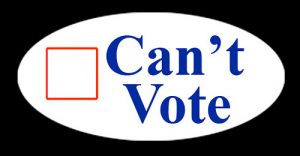Texas Voter I.D. Case Could Dismantle U.S. Civil Rights Law?
 By Peter Malof, Texas News Service
By Peter Malof, Texas News Service
HOUSTON – Court watchers say a Texas case could trigger the dismantling of a decades-old civil rights law.
Steven Shapiro, the American Civil Liberties Union’s national legal director, is to speak in Houston today, analyzing recent trends by the nation’s highest court.
Texas is among nine mostly southern states with a history of discrimination which are required by the 1965 Voting Rights Act to get federal clearance before changing election rules. That’s why a new Texas voter-photo-ID law is on hold: It failed to win the Justice Department’s blessing. The state is now suing, and the case is likely to head to the U.S. Supreme Court.
“The court has dropped some hints that it’s prepared to rethink the whole issue. I would like to believe that the court will not strike down what I think has been the single most successful civil rights law in American history, but I think people are appropriately anxious.”
When the high court recently reviewed a Texas redistricting case, Shapiro says, justices referred to “serious constitutional questions” raised by Section 5, the Voting Rights Act’s pre-clearance provision.
Attorney General Greg Abbott is representing Texas before a District of Columbia district court, challenging Section 5’s constitutionality and arguing that the photo-ID law would not make it harder for minorities to vote. Abbott says the law is necessary to prevent ballot-box fraud.
Shapiro rejects that rationale.
“Neither Texas nor any other state has demonstrated that there actually is a problem, but we know voter ID laws have a seriously disproportionate effect on racial minorities – principally Hispanics in the state of Texas.”
Shapiro believes voter-ID measures suppress minority turnout in much the same way as “poll taxes” did a half-century ago. Minority voters, he explains, are less likely to have mandated forms of identification. The Justice Department maintains that as many as 600,000 Texans may lose the ability to vote if the law is implemented.
Section 5’s critics say it’s not fair to single out certain states, but Shapiro says added scrutiny is warranted in areas with a history of discriminatory practices. However, he adds, that doesn’t mean others can disenfranchise voters.
“No state is allowed to discriminate in voting. It’s true that only some states have to request advance approval, but at the end of the day it’s the same legal standard that applies everywhere: If you discriminate, you’ve violated the law.”
The district court is expected to rule on the voter-ID law this summer. Other similar challenges – such as one in South Carolina – could beat the Texas case to the Supreme Court, but justices are unlikely to hear any appeal before fall. That means the chances are slim Texans will have to show photo identification at the polls in November. A voter registration card is sufficient under current law.
Shapiro will speak at 1 p.m. today at the University of Houston Law Center, 144 Bates Law Building.
The Public News Service (PNS) provides reporting on a wide range of social, community, and environmental issues for mainstream and alternative media that amplifies progressive voices, is easy to use and has a proven track record of success. Supported by over 400 nonprofit organizations and other contributors, PNS provides high-quality news on public issues and current affairs.
[Image By Daquella Manera]
